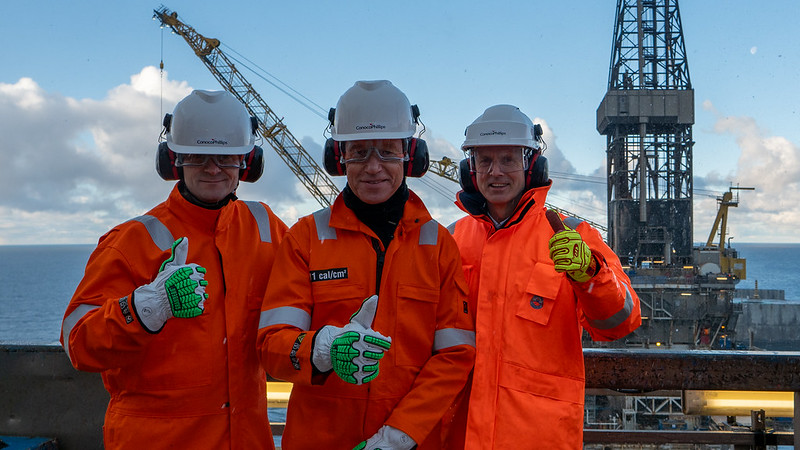The Norwegian government defied noisy climate and environmental advocates outside a major oil industry seminar in Sandefjord on Tuesday, by handing out 62 more oil and gas licenses in the North Sea and its offshore Arctic areas. Critics quickly branded the licenses as a sign of more Norwegian hypocrisy and disregard for international efforts to move away from fossil fuels.

The government has suddenly dropped the word “oil” from what it formerly called its “Oil & Energy Ministry,” in an effort to emphasize other energy sources like hydroelectric and wind, but there’s no question oil and gas remain Norway’s largest industry and greatest source of revenues. Climate and environmental advocates have fought for years to get Norway to halt ongoing oil exploration and cut back on production, since the world isn’t supposed to use any more oil than it’s already found if it’s to meet goals for carbon emission cuts.
Organizations including WWF, Greenpeace and Norway’s chapter of Friends of the Earth have already condemned the granting of more oil and gas licenses. So have several political parties including the Socialist Left (SV), on which Norway’s minority Labour-Center government relies for a majority in Parliament.
On Tuesday, though, it was activists from the more radical Extinction Rebellion organization who were out disrupting the arrival of participants at the Norwegian Petroleum Society’s annual oil and energy policy seminar at the Scandic Park Hotel in Sandefjord. It runs over two days and bills itself as the “most important meeting place” between the Norwegian oil and gas industry and the political milieu. The invitation list includes “carefully chosen” representatives from the Parliament, the government, state agencies, industry leaders and other “key people” in the oil business.

It was expected that the government minister in charge of oil, gas and other forms of energy, Terje Aasland, would announce results of his ministry’s latest round of licensing at the seminar and he did. Exploration areas have already been expanded and Tuesday’s round of “offers” for 62 new production licenses were up from 47 last year. Aasland, whose government still wants to “develop, not phase out” the oil and offshore business, called the awarding of new licenses “a pillar in the continued development” of the Norwegian Continental Shelf.
“To see such great interest in further exploration activity is very encouraging,” Aasland said in his prepared remarks. “This is important for both employment and value creation, as well as for facilitating Norway’s role as a stable energy supplier to Europe.” Norway has been exploiting heightened needs for gas in Europe for all it’s worth, after Russia’s invasion of Ukraine cut off Russian gas supplies.
The licenses offer exclusive rights to exploration, drilling and extraction of petroleum within the geographical areas of the license, and were awarded to a total of 24 companies. Norway’s Equinor, in which the state still owns 67 percent, won the most parts and operating rights, followed by Norwegian-based Aker BP, Vår Energi and DNO Norge. Other companies granted licenses include Germany’s Wintershall DEA Norge, Conoco Phillips and INPEX Idemitsu Norge.
Norwegian Broadcasting (NRK) reported how the protesters outdoors did all they could to divert attention away from Aasland and towards their view of how the licenses will contribute towards more climate change and pose environmental hazards. They had warned they’d be out in force and so were local police, who attempted to keep order and allow seminar participants to enter the hotel.
The demonstrators managed to at least delay the start of the seminar. “With research in hand we can say that today’s licensing will take tens of thousands of human lives,” Extinction Rebellion’s spokesperson Jonas Kittelsen told NRK. “We want to send the strongest possible message to the oil elite, who benefit from the terrible suffering they’re causing. We want them to know there is great opposition to what they’re doing.”
Kittelsen claimed they were not violent, and both the police and hotel management had been informed of their presence in advance. The leader of the Norwegian Petroleum Society organizing the seminar, Erik Sverre Jensen, told NRK he had “no strong opinions” about the demonstration, adding that “they must be allowed to express their viewpoints.
Aasland himself has become accustomed to organized protests against not only oil and gas production but wind turbines and other unpopular forms of energy. “I just believe very strongly that we should continue to develop the Norwegian Continental Shelf, make sure it’s safe for workers and secure export revenues so that we can build on our welfare, like good schools and elder care.”
He’s also convinced the oil and gas industry can continue to develop with the climate in mind. “We will cut emissions and make sure everything proceeds in a good and proper manner,” he claimed, even as doubts rise over whether Norway will meet its climate goals.
NewsinEnglish.no/Nina Berglund

